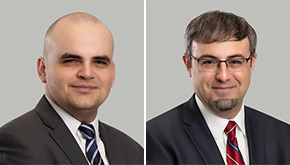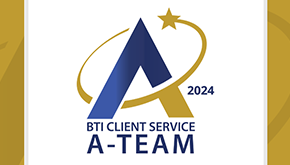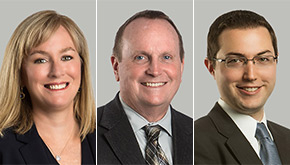The Future of Health Law: Up and Coming Health Law Graduates Reflect on the Center’s Impact on their Careers.
Brandon Hall (’19)
Associate, Healthcare and Employee Benefits
Armstrong Teasdale LLP
SLU LAW Brief: How has your experience with the Center for Health Law Studies impacted your career?
Brandon Hall: My experience with the Center for Health Law Studies helped shape my career in Healthcare Law. Going into law school I knew I was interested in Health Law; the Center for Health Law Studies helped me find my love for ERISA and employee benefits. Healthcare law is broad and complex. Getting a certificate from the Center for Health studies provided me with the tools to navigate those complexities and a strong foundation in statutory and regulatory review and federalism concerns. The Center also has an excellent national reputation as a Top Health Law program. Having that certificate as a part of my credentials has been a valuable tool in networking and growing my practice.
SLB: In your opinion, what kind of story does a course like Grassroots Advocacy tell about the Center?
BH: A course like grassroots advocacy tells both the story of the excellent students who attend SLU Law, and also demonstrates SLU’s commitment to making a positive impact for its neighboring communities and their constituencies. The grassroots class takes the skills acquired and honed throughout law school and applies it to assessing and rectifying community issues affecting healthcare. Using creative problem solving and employing advocacy and relationship building skills, the students effectuate positive healthcare change during each legislative session.
SLB: Why do you think a legal education has helped you with policy work? Why is that important?
BH: Having a legal education has given me a solid foundation for assessing compliance and other legal challenges. Further, having a legal education affords more credibility in the political and policy spheres.
SLB: Why would you encourage a student to take such a course?
BH: I would encourage students to take a class like the Grassroots class for several reasons. First, it is an alternative way to use your legal skills. Second, the course offers an opportunity to make a difference in a community or across the state. Third, it is a great way to network and establish yourself as a subject-matter expert.
SLB: Why did you decide to choose a career path in health law?
BH: Coming from a background of working at a medical device company, I was able to fully understand the impact health insurance and employee benefits have in people’s lives. From my sales experience, I knew I wanted to learn more about how to work in and make a difference in coverage determinations and dealing with insurance companies. As I became familiar with ERISA and the overlap between it and other areas of healthcare law, I was drawn to the complexity and challenges that are often associated therewith and ultimately decided to focus my practice on that area.
SLB: As we celebrate the 40th anniversary of the Center, why do you think it has the staying power and reputation that is has?
BH: Being the nation’s premier health law program for 16 of the last 17 years, is a legacy itself. That said, I think the Center has the staying power it does because of the dedication of the faculty, students, and alumni. The Health Law program continues to draw folks from all over the country to attend; those students come in engaged and with a strong desire to work in healthcare law, and many come in with substantive healthcare experience; the faculty are top-notch and respected names in the field who provide great mentorship and opportunities for the health law students; and finally, the alumni remain engaged with faculty and future classes of students demonstrate a wide scope of ways to put students’ health law degrees to use, whether in private practice, government, or in a JD preferred non-legal role.









































